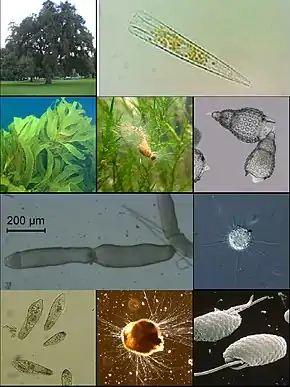Corticata
Le groupe corticata est un clade d'eucaryotees bicontes fondé par Cavalier-Smith[1] et comportant les règnes Plantae[2] et Chromista. Leur nom signifie « qui comporte un cortex ». Leur monophylie n'a pas encore été démontrée et est donc toujours sujette à débat[3].
Corticata

Collage de corticés
| Domaine | Eukaryota |
|---|---|
| Sous-domaine | Bikonta |
Règnes de rang inférieur
- Archaeplastida ou Plantae
- Chromalveolata s.l.
Classification phylogénétique
Phylogénie
Cladogramme selon les études de Cavalier-Smith et Brown Heiss[4],[5]:
| Eukaryota |
| ||||||||||||||||||||||||||||||||||||||||||
Notes et références
- T. Cavalier-Smith, « The phagotrophic origin of eukaryotes and phylogenetic classification of Protozoa », International journal of systematic and evolutionary microbiology, vol. 52, no Pt 2, , p. 297–354 (PMID 11931142)
- T. Cavalier‐Smith, « Megaphylogeny, cell body plans, adaptive zones: causes and timing of eukaryote basal radiations », The Journal of eukaryotic microbiology, vol. 56, no 1, , p. 26–33 (PMID 19340985, DOI 10.1111/j.1550-7408.2008.00373.x)
- (en) Burki F, Shalchian-Tabrizi K, Minge M, Skjæveland Å, Nikolaev SI, et al., « Phylogenomics Reshuffles the Eukaryotic Supergroups », PLoS ONE, vol. 2, no 8: e790, , e790 (PMID 17726520, PMCID 1949142, DOI 10.1371/journal.pone.0000790)
- Cavalier-Smith, T., Chao, E. E., Snell, E. A., Berney, C., Fiore-Donno, A. M., & Lewis, R. (2014). Multigene eukaryote phylogeny reveals the likely protozoan ancestors of opisthokonts (animals, fungi, choanozoans) and Amoebozoa. Molecular phylogenetics and evolution, 81, 71-85.
- Brown, M. W., Heiss, A. A., Kamikawa, R., Inagaki, Y., Yabuki, A., Tice, A. K., ... & Roger, A. J. (2018). Phylogenomics places orphan protistan lineages in a novel eukaryotic super-group. Genome biology and evolution, 10(2), 427-433.
- Portail origine et évolution du vivant
Cet article est issu de Wikipedia. Le texte est sous licence Creative Commons - Attribution - Partage dans les Mêmes. Des conditions supplémentaires peuvent s'appliquer aux fichiers multimédias.